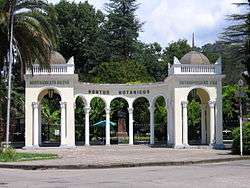Tourism in Abkhazia
Tourism in Abkhazia is illegal under Georgian law through an action of the Georgian government to ban foreigners from entering the occupied territory without permission, as Georgia cannot assure the safety inside disputed territory. However, the Abkazian beaches on the Black Sea continue to be accessible for tourists coming from Russian side of the Abkhazia–Russia border which is not under Georgian control. Low prices and an absence of any visa requirements attracts Russian tourists especially those who can not afford the vacations in Turkey, Egypt, Bulgaria and other popular Russian touristic directions.[1][2]
Background




During the time of the Soviet Union, Abkhazia's Black Sea beaches attracted tourists from a number of surrounding countries, constituting a 40 percent share of the Georgian Soviet Socialist Republic's tourism market. Prior to the 1992-93 war in Abkhazia, over 202,000 tourists visited the region every year.[3] Abkhazia is now a disputed region, with Russia, Nicaragua, Venezuela and Nauru as the only United Nations member states that recognise the territory as an independent nation.[4]
Despite the risks involved, just under 300,000 tourists visit Abkhazia each year, mainly from Russia.[3][5] One of the attraction of visiting Abkhazia as opposed to other Black Sea coastal towns, such as Sochi, is the lower cost of visiting the breakaway state.[6] One night's accommodation in Gagra, for example, cost US$25 in 2003, with the cheapest hotel in the region setting a rate of US$12 for a room and meals in that year. A trainride from a Russian border town of Sochi to the Abkhazian capital of Sukhumi only cost US$1 in 2003. However, Abkhazia's tourism facilities are below Western standards, with much of its infrastructure dating back to the Soviet era.[3]
Attractions
Abkhazia lies on the coast of the Black Sea, and as such, much of its tourism appeal is derived from its coastal resort towns. A number of resort facilities exist in easy and cheap reach of Russian tourists, with Sukhumi and Gagra two of the most popular towns. Tourism is most prevalent in the region's north.[6]
Risks
The main risks of visiting Abkhazia - possible problems with Georgian law on Georgian controlled territory. It is highly recommended not to talk about visit in Abkhazia with Georgian custom officials because it is illegal under Georgian law. Crossing the border with Abkhasia from Russia is free. It is illegal under the Georgian law but the fact of crossing the border is easy to hide because the Abkhazian custom officials don't make any stamps in the visitors passports since 2014.
The other risks are typical for any beach resorts like beach thefts, night robbery, local car drivers who often violate the traffic rules and fraud.
See also
References
- ↑ http://abkhasia.kavkaz-uzel.ru/articles/165554/
- ↑ http://chechnya.kavkaz-uzel.ru/articles/164334/
- 1 2 3 Chanadiri, Goga (August 22, 2003). "Abkhazia's beauty out of sight". Civil.ge. Retrieved January 27, 2011.
- ↑ "U.S. critical about Nauru recognition of Abkhazia, S. Ossetia". RIA Novosti. December 17, 2009. Retrieved January 27, 2011.
- ↑ Gvaramia, Gocha (July 22, 2010). "Tourist season in Abkhazia: so who is lying?". Expert Club. Retrieved January 27, 2011.
- 1 2 Weir, Fred (July 2, 2008). "Abkhazia's tourism fights to regain fabled legacy". Christian Science Monitor. Retrieved January 27, 2011.
External links
-
 Abkhazia travel guide from Wikivoyage
Abkhazia travel guide from Wikivoyage - Tourist site of Abkhazia Republic